11 Trailblazing Women Honored by the Disney Conservation Fund
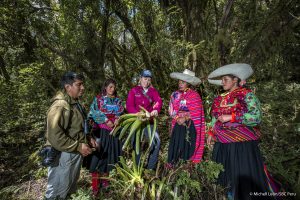
Environmental Sustainability & Nature
March 25, 2024
In a month that celebrates women and their many accomplishments, and ahead of the start of Earth Month in April – we’re taking this opportunity to recognize some inspirational women, too. The Disney Conservation Fund is proud to support ten programs led by incredible women dedicated to working with communities around the world to create a healthier planet for people and wildlife. These women – and their inspiring teams – demonstrate passion for people, unwavering commitment to the planet, and have positively impacted the future of wildlife from lions in Africa to orangutans in Indonesia to monk seals in Hawaii.
Dr. Amy Dickman & Dr. Alayne Cotterill, Lion Landscapes
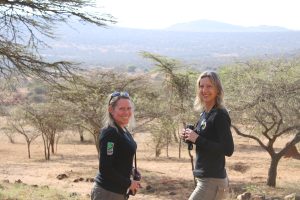
Amy Dickman, Ph.D. and Alayne Cotterill, Ph.D. have spent more than 30 years working on the conservation of large carnivores in East and Southern Africa. In 2020, they formed Lion Landscapes and as joint CEOs, lead an exceptional team championing carnivore conservation while ensuring tangible benefits for wildlife and indigenous communities across Kenya, Tanzania, and Zambia. Amy’s years of dedication, extensive publication record, and roles within Oxford University and the International Union for Conservation of Nature have earned her recognition as a National Geographic Explorer and positioned her as a leading figure in wildlife conservation who has had a profound impact on global carnivore conservation. Alayne’s pioneering work addresses the intricate challenges of large carnivore conservation, emphasizing innovative, community-based solutions and building effective partnerships. Together, they approach conservation with bravery, transparency, and a collaborative spirit. They openly discuss their triumphs and setbacks, embrace complex and controversial topics, and contribute to efforts like the formation of the Pride Lion Conservation Alliance with four other conservation leaders in 2015 to tackle lions’ primary threats while enhancing local livelihoods. Through their leadership, Amy and Alayne have been instrumental in devising new conservation models, mitigating human-wildlife conflict, empowering communities, and fostering sustainable, equitable conservation practices.
Belinda Mackey, Grevy’s Zebra Trust
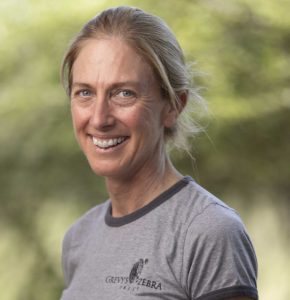
Kenyan-native Belinda Low Mackey has worked for 21 years with indigenous communities to conserve endangered Grevy’s zebras. She co-founded the Grevy’s Zebra Trust (GZT) in 2007 based on the belief that solutions for Grevy’s zebras must also be solutions for people. Recognizing land degradation as a critical threat to zebras and people, Belinda introduced regenerative livestock grazing practices to support people and heal the land. Her team developed the successful Scout, Ambassador and Warrior Programmes , empowering local people to lead long-term wildlife monitoring, and also empowered women to lead restoration work, resulting in significant land recovery. The team’s life-saving efforts for Grevy’s zebra during crises such as droughts have also dramatically impacted survival of this endangered species. Through these efforts, GZT has created a conservation network of dedicated team members employed from communities living with the zebras across 10,000km2. Belinda always had a vision for GZT to be locally led, and she is proud to be transitioning leadership to her Samburu colleague Peter Lalampaa, while remaining a committed strategic advisor.
Dr. Cheryl Knott, Gunung Palung Orangutan Conservation Program
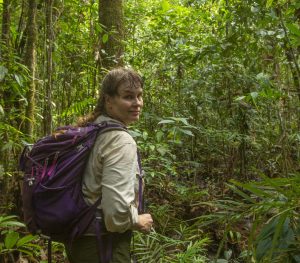
Co-founder of the Gunung Palung Orangutan Conservation Program (GPOCP), Cheryl Knott, Ph.D. works to protect critically endangered orangutans and their rainforest habitat in Indonesia. Her team has helped communities secure and manage nearly 100 km2 of rainforest habitat across eight village forests and helped hundreds of families reduce illegal logging and adopt environmentally-friendly income sources including organic farming and aquaculture. GPOCP’s education programs inspire conservation stewardship among thousands of people each year. Cheryl and her team also actively engage with government organizations to reduce illegal wildlife trade that threatens orangutans and other wildlife. Through their long-term research program, the team uses innovative tools to monitor habitats and biodiversity, as well as studies how orangutans respond to changing environments. This research ensures conservation efforts address the most critical threats to orangutans and their habitats. Dr. Knott earned her Ph.D. from Harvard University and is a Professor of Anthropology and Biology at Boston University. She is a National Geographic Emerging Explorer, a fellow of the Explorers Club, and has published over 70 scientific articles.
Deepshikha Sharma, International Snow Leopard Trust

Deepshikha Sharma of the Nature Conservation Foundation and the International Snow Leopard Trust has always been inspired by communities living close to wildlife and, against all odds, working to conserve it. Since completing her masters degree in 2019, Deepshikha has been working closely with agro-pastoralist communities in India who share the trans-Himalayan landscape with snow leopards. She is the force behind the “Women for Snow Leopards” project, a new initiative to establish a network of local conservation champions across four critical snow leopard habitats and expand snow leopard conservation initiatives. Deepshikha’s team will be India’s first women-led effort to monitor snow leopards, and a crucial step toward growing gender-inclusive conservation leadership. In partnership with Conservation Nation, Deepshikha is training her team to deploy and recover camera traps that will provide vital information on the snow leopard species’ status and population trends, and can help identify emerging threats and evaluate the effectiveness of conservation actions.
Dr. Emily Otali, Kasiisi Project
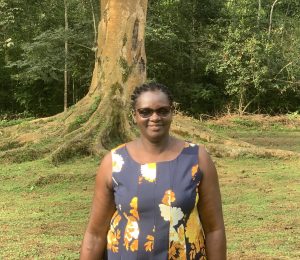
Emily is a primatologist specializing in chimpanzee behavior and the first African woman to receive a Ph.D. in this field. Emily has devoted her life to the conservation of Kibale National Park, Uganda, and its communities. For nearly two decades, she has led the Kasiisi Project (locally called Kibale Forest Schools Program, KFSP) as Country Director and Kibale Chimpanzee Project (KCP) as Field Director. Under Emily’s leadership, KFSP’s education, health, and conservation initiatives have transformed its forest-edge primary schools into a model for the region, reaching 8,000+ children per year and inspiring a generation committed to conservation. KCP is among the longest-running chimpanzee research and anti-poaching projects and has played a critical role in safeguarding the park and its chimpanzees. A recognized National Geographic Explorer and Women for the Environment Africa Fellow, Emily is also an inspirational role model passionate about empowering girls; she has mentored 150+ secondary and university students through KFSP’s scholarship program.
Dr. Estelle Sandhaus, Santa Barbara Zoo
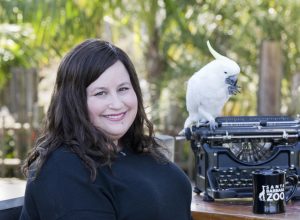
From her start as a biology student at University of California, San Diego, Estelle’s passion for animal behavior and conservation drove her graduate research and led her to the Santa Barbara Zoo, which works with various agencies to recover threatened and endangered species from monarch butterflies to southern sea otters. Drawn to the plight of reintroduced California condors, she partnered with the U.S. Fish and Wildlife Service to develop the California Condor Nest Guarding Program. Thanks to Estelle and her team’s thousands of hours of field observations, interventions, and education and outreach in the urban communities that share the condor’s landscape, condor nest success has dramatically increased. Today, more than one quarter of the southern California condor flock is wild-born, and her team’s work has been published in books and scientific journals, presented worldwide, and featured in popular media. Estelle is passionate about conserving vultures globally and serves as Program Leader for the Association of Zoos and Aquariums African Vulture SAFE Program, which supports field partners in Kenya, Tanzania, and South Africa.
Dr. Gabriela Rezende, Instituto de Pesquisas Ecologicas
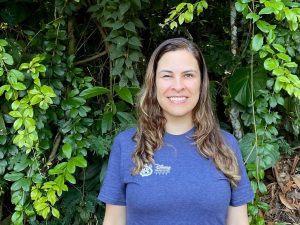
Nestled in the heart of São Paulo, Brazil, Gabi’s journey unfolded amidst shifting sugar cane fields that once housed forests. A profound connection with nature and a chance encounter with a tiny tamarin monkey, its eyes brimming with curiosity and resilience, set her on a path towards protecting this special species and its habitat. For a decade, she has spearheaded Instituto de Pesquisas Ecologicas’ (IPÊ) groundbreaking project on endangered black lion tamarins and contributed to the recovery and protection of Brazil’s Atlantic Forest. Gabi has tirelessly advocated for the coexistence of people and nature while expanding protected habitats for tamarins and increasing forest connectivity through innovative habitat management techniques. Her pioneering research methodologies paved the way for a deeper understanding of these animals, while her efforts in population management offers a lifeline to tiny, isolated populations. As a young researcher, devoted mother, and pivotal member of a women-led organization, Gabi embodies resilience and dedication. She represents hope and is inspiring a new generation of women conservationists to pursue their aspirations to make the world a better place.
Robyn Appleton, Spectacled Bear Conservation Peru

Robyn is a biologist with over 20 years of field experience studying bears in North and South America. She established Spectacled Bear Conservation (SBC) after discovering a rare and threatened spectacled bear population in Peru’s dry forest in 2007. Driven by her love for these bears, she guides SBC’s research, yielding groundbreaking findings that advance knowledge of this bear species. SBC’s 17-year study has provided critical data for conservation action, including a private land purchase to protect key bear habitat. In 2022, she expanded SBC’s impact by starting a collaboration with Peru’s government to help conserve bears in Machu Picchu. Robyn is also a passionate advocate for empowering women and communities and believes that improving the well-being of people is essential for long-term conservation success. SBC’s alternative livelihood program empowers women from rural and indigenous communities with a sustainable income, training, and opportunities.
Dr. Sophie Whoriskey, DVM, The Marine Mammal Center
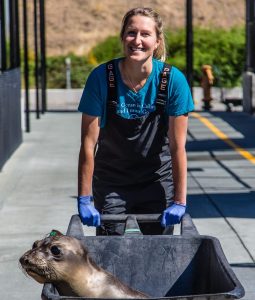
Since graduating from the Atlantic Veterinary College on Canada’s Prince Edward Island, Dr. Sophie Whoriskey has been dedicated to improving the lives of aquatic animals. Committed to ocean conservation from an early age, Sophie has extensive experience working in remote and harsh environments and has supported research projects from Alaska to Antarctica, all with a mission of advancing the global body of knowledge on marine mammal health. Dr. Sophie now leads the rehabilitation program at Ke Kai Ola (“The Healing Sea”), The Marine Mammal Center’s Hawaiian monk seal hospital on the island of Hawaiʻi. With fewer than 1,600 remaining, rescued seals get a second chance at life and their powerful stories inspire people to take actions that positively impact ocean health.
Dr. Tara Stoinski, Dian Fossey Gorilla Fund
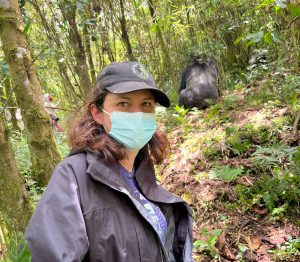
Dr. Tara Stoinski, president and CEO/chief scientific officer of the Dian Fossey Gorilla Fund, is a primatologist and global leader in the study and conservation of gorillas. During her 20+ years at the Fossey Fund, Tara has led her organization’s work resulting in meaningful achievements protecting gorillas, advancing research, training conservationists, and building resiliency in local communities. Tara now leads a team of nearly 400 people working to save gorillas and their critical habitats in Rwanda and eastern Democratic Republic of the Congo. Committed to equipping the conservation leaders of today and tomorrow with the skills to succeed, Tara led the development of the Ellen DeGeneres Campus, an award-winning research and educational facility in Rwanda that provides hands-on training opportunities to hundreds of early career scientists each year. Her work has been featured in numerous press outlets, and she continues highlighting the significance of gorilla conservation for global biodiversity and the health of the planet through her work every day.
Since 1995 the Disney Conservation Fund has invested more than $125 million to support community-based programs working to protect wildlife and their habitats globally and invest in the next generation of conservation leaders, like these incredible women. To learn more about our efforts, visit disney.com/conservation.
